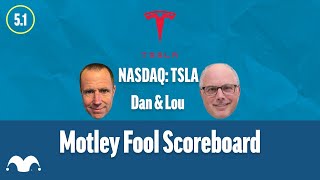Legendary investor Warren Buffett is no stranger to electric vehicle (EV) stocks. He once made more than 2,000% in profits by investing in Chinese EV maker BYD. He owned that company for more than 17 years before selling, proving how crucial it is to believe in these businesses over the long term.
Next year should be one of the most exciting years in EV history. And there are several ways for your portfolio to win. If you're looking for high-growth investments that can pay off big in 2026, take your pick from the following three companies.
1. Tesla could become a robotaxi giant
When it comes to EV stocks, Tesla (TSLA 2.23%) remains king. The company is one of the biggest EV producers in the world, with unparalleled access to capital to invest in new opportunities. Arguably the biggest growth opportunity in company history won't come from manufacturing cars, but from using them to operate its own robotaxi service.
Earlier this summer, Tesla launched its robotaxi service in Austin, Texas. The rollout hasn't been perfect. But last quarter, Elon Musk predicted that the service would expand to 8 to 10 new cities by the end of 2025. He also reiterated his desire to remove safety monitors from the equation, allowing the company to expand to "millions" of self-driving Tesla taxis by the end of 2026.

NASDAQ: TSLA
Key Data Points
I'm skeptical that Tesla will reach Musk's optimistic targets. I don't expect the service to expand to 10 new cities this year, nor do I expect millions of Tesla's Cybertaxis on the streets next year.
But some Wall Street analysts are buying what Musk is selling. Dan Ives, for example, thinks the robotaxi opportunity could add $1 trillion to Tesla's market cap by the end of 2026.
If the company can execute on its goals, there is undoubtedly plenty of growth ahead for investors. But if you're looking for a better balance of risk and reward, check out the next EV stock.

Image source: The Motley Fool.
2. Rivian looks like a value stock headed for growth
On paper, Rivian Automotive (RIVN 4.56%) is a Tesla competitor. Both companies produce EVs that are primarily sold to the U.S. market. But there are big differences, too.
Tesla has a market cap of $1.4 trillion. Rivian, meanwhile, is valued at just $15 billion. Tesla stock is also much more expensive. Shares trade at roughly 16 times sales, versus a price-to-sales ratio of just 3 for Rivian.
In a nutshell, it is tiny compared to Tesla, with a significantly smaller valuation. If you're looking for a bargain with huge growth potential, it could fit the bill.

NASDAQ: RIVN
Key Data Points
Importantly, Rivian doesn't have the robotaxi upside that Tesla has. But it does have an ace up its sleeve for 2026. Next quarter, the company is expected to begin production of three new affordable models: the R2, R3, and R3X.
The R2 will begin production first, followed by the other two models. Crucially, all three will be priced under $50,000 -- an important threshold considering that nearly 70% of Americans want their next vehicle to cost under $50,000.
Today, more than 90% of Tesla's vehicle revenue comes from its two affordable models. With three affordable models in its lineup next year, Rivian could see sizable sales growth, similar to what Tesla achieved earlier in its history.
3. Lucid Group is high risk, high reward
Tesla stock is expensive, but the growth potential is clear. Rivian stock is cheap, but its growth potential is also clear. Lucid Group (LCID 8.24%) is somewhere in between.
Lucid shares currently trade at around 6 times sales -- in the middle of Rivian's and Tesla's valuation. The company also plans on launching new affordable models, but this likely won't occur until the end of 2026 at the earliest. More likely, these models will arrive in 2027 or 2028.

NASDAQ: LCID
Key Data Points
Lucid is also involved in the robotaxi market, but not as directly as Tesla. The company will deliver 20,000 vehicles to Uber Technologies as part of that company's robotaxi division. But after the initial sale, Lucid won't have residual revenue from the deal.
All of this puts Lucid in a strange position. Shares are more expensive than Rivian's, but the company doesn't have a near-term plan to launch affordable models. And while shares are cheaper than Tesla's, the company's robotaxi exposure is far less lucrative. Lucid could still have upside with a market cap of just $5 billion. But I'm sticking with either Tesla or Rivian in 2026.







